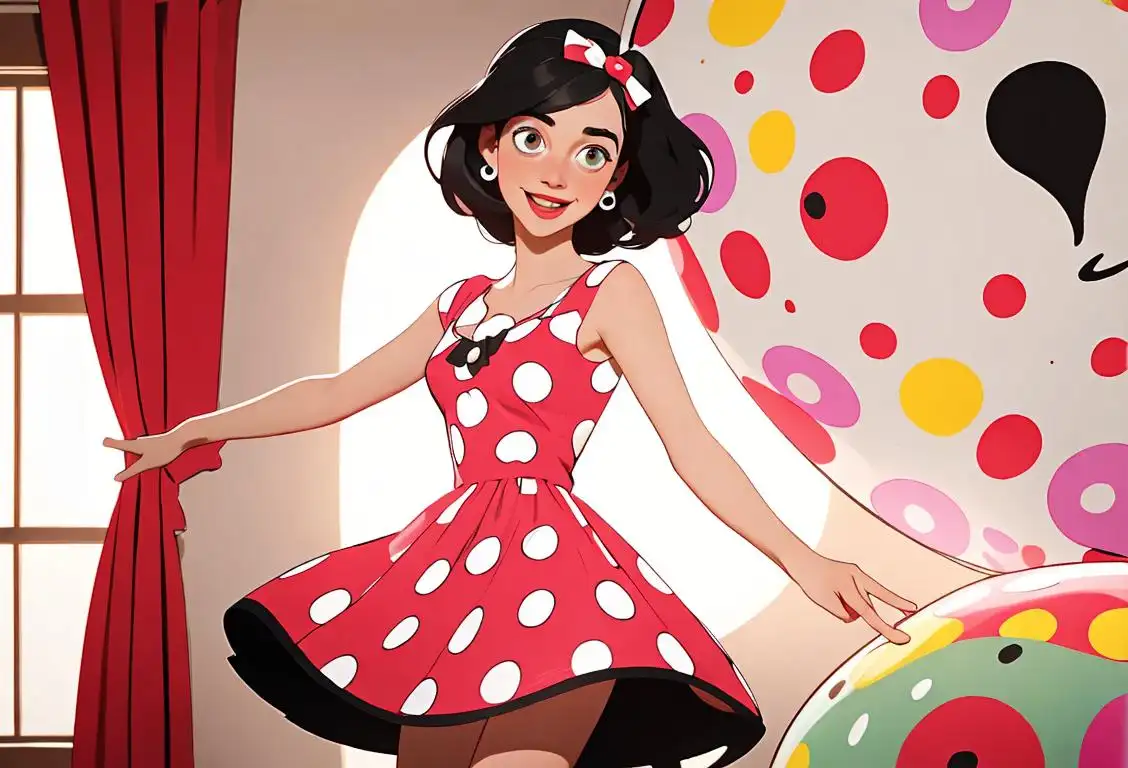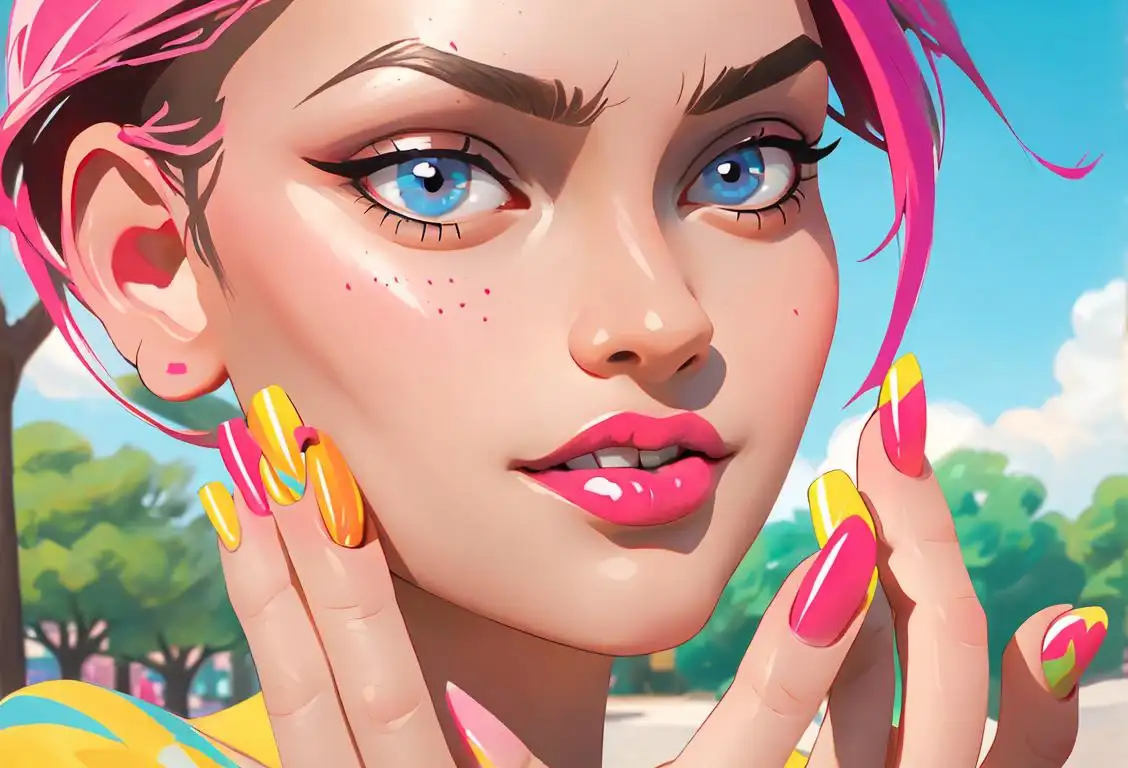National Polkadot Day

Get ready to groove and twirl because it's National Polkadot Day! This whimsical holiday celebrates all things polka dots, from fashion to decor and everything in between. So grab your favorite polka dot attire and join in the dotted festivities!
When is Polkadot Day?
It's national polkadot day on the 23rd January.
What is National Polkadot Day?
National Polkadot Day is a joyous occasion dedicated to the polka dot pattern. Originating from the dance called 'polka,' this playful pattern features evenly spaced, often colorful dots on a contrasting background. The polka dot design has become an iconic symbol in fashion, interior design, and pop culture.
This cherished pattern has its roots dating back to the mid-19th century when polka dancing was all the rage. The polka dance, characterized by its lively and energetic steps, inspired designers to create a pattern that mirrored the bouncy nature of the dance. Thus, the polka dot was born, bringing delight and cheerfulness to fabrics, accessories, and various other items.
Today, National Polkadot Day is a chance to embrace the whimsy and charm of the polka dot. It's a day to wear, display, and appreciate these dotted delights in all their glory.
Fun Ways to Celebrate National Polkadot Day
1. Stylish Wardrobe: Dress up in your favorite polka dot ensemble. Whether it's a retro-inspired dress or a modern polka-dotted shirt, let your fashion sense go dot-crazy!
2. Home Decor: Spruce up your living space with polka dot accents. Add polka dot throw pillows to your couch, hang polka dot curtains, or display polka dot art on your walls. Let the dots take over!
3. Polka Dot Party: Host a polka dot-themed party and invite your friends to join in the fun. Serve polka dot cupcakes, play polka tunes, and encourage everyone to come dressed in their spottiest attire. It's bound to be a memorable and whimsical celebration!
Did You Know?
Did you know that the world record for the largest gathering of people dressed in polka dots was set in Japan? In 2016, a whopping 1,268 people gathered in Tokyo, all donning polka dot outfits to celebrate the pattern's charm and appeal. Talk about a polka dot parade!
History behind the term 'Polkadot'
1840
The Birth of Polkadot
The term 'polkadot' first emerged in the mid-19th century, around the year 1840. It originated from the combination of two words: 'polka,' a lively dance originating from Bohemia, and 'dot,' a small round mark or spot. The polka dance was known for its energetic movements and colorful costumes, often adorned with small dots or spots, which eventually led to the term 'polkadot' being associated with this pattern.
1840
Polka music gains popularity
In the year 1840, polka music emerged as a lively dance style in Bohemia. The term 'polka' referred to both the music and the accompanying dance, which quickly gained popularity throughout Europe. The energetic and rhythmic nature of the polka dance created a sense of joyful merriment among its participants.
1840
The Polka Craze Begins
The term 'polkadot' originated during the height of the Polka craze in the 1840s. The Polka dance, a lively and energetic couples dance, swept across Europe and the United States, captivating dancers with its lively tempo and spirited movements. As the dance grew in popularity, fashion trends of the time sought to capitalize on its success, leading to the creation of the term 'polkadot' to describe a particular pattern.
1900
The Birth of Polkadots
The term 'polkadot' was first coined around the year 1900. It originated from the combination of the words 'polka' and 'dot'. The polka dance was extremely popular during this time, and it gave rise to various elements of popular culture, including the polkadot pattern.
1852
Polka dots make their appearance
Around the year 1852, the term 'polka dot' made its appearance in fashion. The pattern, consisting of small, evenly spaced circles, became increasingly popular in clothing and textiles. Polka dots were often seen on dresses, accessories, and even home decor, adding a touch of whimsy and playfulness to fashion and design.
1926
Polkadots in Fashion
In 1926, the polkadot pattern made its grand entrance into the world of fashion. The iconic Minnie Mouse, created by Disney, was depicted wearing a polkadot dress. This portrayal sparked a fashion trend, and polkadots quickly became a symbol of playful and feminine style.
1857
Fashionable Polkadot Craze
In the late 1850s, the polkadot pattern gained immense popularity in the fashion industry. French designers, such as Charles Frederick Worth, began incorporating the polkadot motif into their designs, creating a fashion craze. Polkadot dresses, accessories, and even umbrellas became highly sought after. The trend quickly spread across Europe and the United States, solidifying the term 'polkadot' as a widely recognized pattern and style.
1857
The First Polkadot Fashion
The first known instance of the term 'polkadot' being used to describe a fashion trend can be traced back to 1857. A British magazine called 'Godey's Lady's Book' featured an article discussing the latest fashion sensation termed 'Polka spotted muslins.' These muslin dresses were adorned with small, evenly spaced dots, reminiscent of the lively Polka dance. The term quickly gained traction in the fashion world, and 'polkadot' became synonymous with playful, patterned apparel.
1940s
Polkadots in Pop Culture
During the 1940s, polkadots became even more popular in pop culture. They began appearing in music, films, and advertisements, further solidifying their status as a fashionable and fun pattern. The catchy song 'Itsy Bitsy Teenie Weenie Yellow Polkadot Bikini' by Brian Hyland became a massive hit in 1960 and further contributed to the polkadot craze.
1926
Polkadot on the Big Screen
One significant milestone in the popularization of 'polkadot' was the release of the film 'My Fair Lady' in 1926. The movie starred actress Mary Pickford, who wore a polkadot dress during a pivotal scene. This iconic cinematic moment solidified the polkadot pattern in mainstream culture, making it a desirable and fashionable choice for women's clothing.
1926
Polka dot frenzy in Hollywood
The year 1926 witnessed a polka dot frenzy in Hollywood. The glamorous world of film showcased polka dot fashion, with actresses like Mary Pickford and Betty Boop sporting polka dot dresses on the silver screen. The combination of the polka dot pattern and the Hollywood spotlight further fueled the popularity of this playful design.
1926
Polkadots on the Silver Screen
The term 'polkadot' made its way into the entertainment industry in the 1920s. In 1926, Disney released an animated short film titled 'The Silly Symphony - The Merry Dwarfs,' which introduced a character named 'Polkadot.' The lovable dwarf was depicted wearing a costume covered in colorful polkadots, further popularizing the pattern in popular culture. This marked a significant milestone in the cultural impact of the term 'polkadot'.
1940s
Polkadots and Pin-Up Girls
During World War II, polkadots became closely associated with pin-up girls. The iconic pin-up style featured feminine outfits, often with polkadot patterns, designed to boost morale among soldiers. The famous pin-up model, Bettie Page, frequently posed in polkadot swimsuits and dresses. The combination of polkadots and pin-up girls further solidified the term's association with retro fashion and vintage aesthetics.
1951
Polkadots on the Silver Screen
The year 1951 saw the release of the classic film 'Polka Dot Puss' by Tom and Jerry. This animated short showcased the misadventures of an adorable polkadot kitten and its encounters with Tom, the cat, and Jerry, the mouse. The film increased the popularity of polkadots and established them as a timeless pattern associated with both cuteness and humor.
1940s-1950s
Polka dots embraced by fashion icons
During the 1940s and 1950s, polka dots were embraced by fashion icons such as Marilyn Monroe and Lucille Ball. The charm and versatility of polka dot clothing became a symbol of femininity and retro chic. Polka dot dresses, bikinis, and accessories became iconic symbols of the era, defining a style that continues to inspire designs to this day.
1940s
The Polkadot Explosion
The 1940s saw a proliferation of the polkadot pattern in various forms. Fashion designers such as Christian Dior incorporated polkadot prints into their collections, solidifying its status as a timeless and fashionable pattern. Additionally, the polkadot became a symbol of joy and optimism during a tumultuous period in world history, offering a lighthearted and playful aesthetic to contrast with the severity of war.
1980s
Polkadots as a Sign of Rebellion
In the 1980s, the punk and new wave subcultures adopted the polkadot pattern as a symbol of rebellion against mainstream fashion. British fashion designer, Vivienne Westwood, incorporated polkadots into her iconic punk designs, breaking traditional fashion norms. The pattern's transformation from a symbol of innocence to one of rebellion showcases its versatility and cultural significance.
1980s
Polkadot Revival
After a brief hiatus, the 1980s witnessed a revival of the polkadot trend. Pop culture icons, such as Madonna and Cyndi Lauper, embraced the pattern, incorporating it into their eccentric and innovative fashion choices. This resurgence in popularity reintroduced the polkadot to a new generation, solidifying its timeless appeal and association with retro fashion.
1960s-present
Polka dots in popular culture
From the 1960s onwards, polka dots have made their mark in popular culture. The iconic polka dot bikini worn by Brian Hyland in his hit song became a cherished symbol of summertime fun. Polka dot patterns have continued to be featured in various forms of media, influencing fashion trends, interior design, and even art. Today, polka dots are recognized worldwide as a playful and timeless design element.
1962
Polkadot Pop Culture Icon: Minnie Mouse
In 1962, the beloved Disney character Minnie Mouse was given a stunning polkadot makeover by designer Mary Blair. Minnie's iconic outfit, comprising a red polkadot dress, yellow shoes, and a matching bow, became her signature look. The character's enduring popularity and association with polkadots made them even more synonymous with timeless charm and cheerful aesthetics.
Present
Polkadots, Timeless and Contemporary
Today, polkadots remain a beloved and recognizable pattern in various aspects of our lives. They can be found in fashion, interior design, accessories, and even in digital media. With their ability to evoke a sense of whimsy, nostalgia, and boldness simultaneously, polkadots continue to be celebrated as a timeless and versatile design element.
21st Century
Polkadots in Modern Fashion
Polkadots have continued to evolve and remain a prominent design element in modern fashion. Renowned fashion designers like Marc Jacobs, Valentino, and Stella McCartney have incorporated polkadots into their collections, keeping them in vogue. The term 'polkadot' now encompasses a wide range of patterns, from classic black and white to vibrant multicolored variations, catering to diverse fashion tastes and preferences.
Present Day
Polkadot Perseverance
In the present day, the term 'polkadot' continues to evoke a sense of charm and nostalgia. It remains a popular pattern in fashion, home decor, and various design industries. The polkadot's enduring allure owes much to its rich cultural history and its ability to evoke a whimsical and joyful sentiment in those who encounter it.
Did you know?
Did you know that the world record for the largest gathering of people dressed in polka dots was set in Japan?Tagged
fun fashion party decorFirst identified
24th January 2016Most mentioned on
23rd January 2017Total mentions
18Other days
Polkadot Day
Bow Tie Day
Batik Day
Nail Polish Day
Dress Like Your Inner Hoe Day
Ugly Christmas Sweater Day
Handbag Day
Hat Day
Pizza Party Day
Chip And Dip Day







